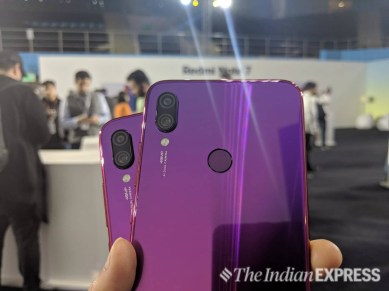Xiaomi Redmi Note 7 vs Redmi Note 7 Pro: All specs compared
Xiaomi has officially launched the Redmi Note 7 and Redmi Note 7 Pro, so let's compare the two phones on the basis of specifications.

Xiaomi has launched the latest generation of its Redmi Note lineup of smartphones, including the Redmi Note 7 and Redmi Note 7 Pro in India. These are the first smartphones that the company has launched under its recently split Redmi sub-brand.
To recall, Redmi by Xiaomi launched the Redmi Note 7 last month in China and teased the Redmi Note 7 Pro. The Chinese variant comes with a different camera unit compared to the Indian variant. India is the first country, where the company has launched the Redmi Note 7 Pro.
Redmi Note 7 and Note 7 Pro: Prices, India availability
Redmi Note 7 has been made available in two RAM/storage variants – 3GB RAM/32GB storage and 4GB RAM/64GB storage priced at Rs 9,999 and Rs 11,999, respectively. Whereas, the Redmi Note 7 Pro 4GB RAM/64GB storage variant is priced at Rs 13,999 and the 6GB RAM/128GB storage variant is priced at Rs 16,999.
Redmi Note 7 will go on sale in India on March 6, whereas Redmi Note 7 Pro will be available from March 13, 2019. The phones will be available on Flipkart, Mi.com and Mi Home stores.
Redmi Note 7 and Note 7 Pro: Display, Design
Redmi Note 7 and Note 7 Pro feature a 6.3-inch FHD+ display with an aspect ratio of 19.5:9. They sport a waterdrop-style notch, similar to the Samsung M10 and M20. Both phones also share similar design language, sporting a glass body, metal frame and a dual-camera setup on the back.
Both the phones have water-tight sealed ports and a P2i coating has been applied to the internals to have better water resistance.
When it comes to the colour options, Redmi Note 7 will be made available in three shades in India including Onyx Black, Ruby Red and Sapphire Blue.
Whereas, the Redmi Note 7 Pro also comes in three colour options to choose from. These include Neptune Blue, Nebula Red and Space Black.
Redmi Note 7 and Note 7 Pro: Processor, RAM, Storage
Redmi Note 7 is powered is powered by the octa-core Qualcomm Snapdragon 660 processor paired with an Adreno 512 GPU. The device has been made available in two RAM/internal storage variants – 3GB RAM/32GB internal storage and 4GB RAM/64GB internal storage. It also features a microSD expansion slot, which allows consumers to expand storage by 256GB.
Coming to the Redmi Note 7 Pro, it is powered by the Qualcomm Snapdragon 675 processor built on TSMC’s 11nm manufacturing process. The device comes with an Adreno 612 GPU.
Like the Redmi Note 7, this also has been made available in two RAM/internal storage variants. These include the 4GB RAM/64GB internal storage variant and the 6GB RAM/128GB internal storage variant. It also features expandable storage up to 256GB via a microSD card.
Redmi Note 7 and Note 7 Pro: Cameras
Interestingly, the Indian variant of the Redmi Note 7 comes with a 12MP primary sensor paired with a 2MP secondary depth sensor as opposed to a 48MP Samsung ISOCELL GM-1 sensor. We do not know the real reason behind the move. On the front, you will find a 13MP camera for taking selfies and video chat.
Like the Redmi Note 7, the pro variant too features a dual-camera setup. However, there is a difference between camera specifications. The setup consists of a primary 48MP Sony IMX586 sensor paired with a 5MP secondary depth sensor. Keep in mind that this is the same camera sensor which can be found inside the Honor V20 smartphone. The back camera comes with support for shooting 4K video. On the front, it features a 13MP sensor to take selfies.
The device comes with a number of artificial intelligence (AI) powered features for the cameras. These include AI scene detection, AI Portrait 2.0 and Night mode.
Redmi Note 7 and Note 7 Pro: Battery, OS, Connectivity
Both the devices run Google’s Android 9.0 Pie operating system with the company’s own MIUI 10 skin on top. They also have the same 4,000mAh battery with support for Qualcomm’s Quick Charge 4.0 fast charging technology.
In terms of connectivity options, both the devices sport a rear-mounted fingerprint sensor, a USB Type-C port, 3.5mm headphone jack, Wi-Fi 5, Bluetooth 5.0, Infrared and a hybrid dual SIM card slot.